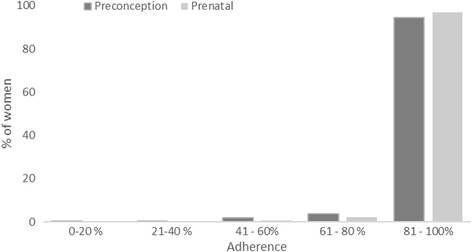Predictors of adherence to micronutrient supplementation before and during pregnancy in Vietnam
- PMID: 28511688
- PMCID: PMC5434576
- DOI: 10.1186/s12889-017-4379-4
Predictors of adherence to micronutrient supplementation before and during pregnancy in Vietnam
Abstract
Background: Poor adherence to micronutrient supplementation often limits the effectiveness of public health programs. While predictors of adherence to micronutrient supplementation during pregnancy are well documented, information on adherence to preconception supplements is scarce. The objective of this study was to describe the predictors of adherence to preconception and prenatal micronutrient supplementation among women participating in a randomized control trial in Vietnam.
Methods: Adherence data were collected prospectively from a double blind randomized controlled trial in rural Vietnam. Five thousand eleven women of reproductive age were randomized to receive preconception supplements for weekly consumption containing either: Folic Acid, Iron and Folic Acid (IFA), or Multiple Micronutrients. Women who became pregnant received prenatal IFA supplements for daily consumption through delivery. Village health workers visited participants' homes every two weeks to deliver supplements and record consumption and side effects. Multivariate logistic regression was used to assess individual, household, and programmatic predictors of supplement adherence.
Results: Adherence was high with 78 and 82% of the women consuming more than 80% of the preconception and prenatal supplements, respectively. Women of minority ethnicity (OR = 0.78 95% CI = 0.67, 0.91) and farmers (OR = 0.71 95% CI = 0.58, 0.88) were less likely to consume >80% of the preconception supplements while socioeconomic status (SES) (OR = 2.71 highest vs. lowest quintile; 95% CI = 2.10, 3.52) was positively associated with >80% adherence in the entire preconception sample with available information (n = 4417). Women in their first pregnancy had lower prenatal adherence compared to multiparous women. At the programmatic level, each village health worker visit was associated with higher odds of >80% adherence by 3-5% before pregnancy and 18% during pregnancy.
Conclusions: Key determinants of adherence included SES, ethnicity, occupation (farmer) and parity which may be helpful for targeting women for counseling on supplement adherence. Increased contact with village health workers was positively associated with adherence to micronutrient supplementation both before conception and during pregnancy indicating the need for resources to support community outreach to women of reproductive age.
Trial registration: NCT01665378 . Registered on August 12, 2012.
Keywords: Adherence; Maternal nutrition; Micronutrient supplementation; Prenatal supplementation; Side effects; Vietnam; Women of reproductive age.
Figures
References
-
- Organization WH . Essential nutrition actions: improving maternal, newborn, infant and young child health and nutrition. Geneva: Organization WH; 2013. - PubMed
-
- Gebremedhin S, Samuel A, Mamo G, Moges T, Assefa T. Coverage, compliance and factors associated with utilization of iron supplementation during pregnancy in eight rural districts of Ethiopia: a cross-sectional study. BMC Public Health. 2014;14:607. doi: 10.1186/1471-2458-14-607. - DOI - PMC - PubMed
Publication types
MeSH terms
Substances
Associated data
LinkOut - more resources
Full Text Sources
Other Literature Sources
Medical


